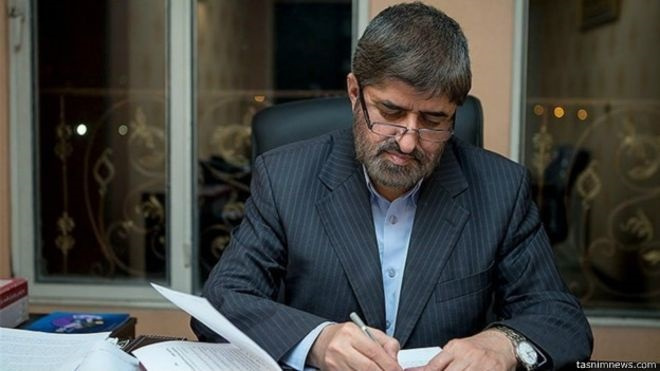Principlists and Reformists at Loggerheads Again; This Time over Cancellation of a Speech

On Sunday, November 20th, while people were heading towards Sapco Auditorium in central Mashhad, northeastern Iran, to listen to 2nd Deputy Speaker of Majles Ali Motahari speak on the occasion of Arbaeen, they faced closed doors of the hall and police’s announcement that the event has been cancelled, and its call for the visitors to dipserse.
Soon it became clear that while Motahari’s speech had been authorized by the body in charge, that is, Ministry of Interior’s provincial directorate in Razavi Khorasan Province, prosecutor general of the city had opted for cancellation of the event.
This was not the first time Motahari to talk outside his constituency of Tehran. In March 2015, he had faced a much more severe reaction in Shiraz, southern Iran, when vigilantes on motorbikes chased after the taxi taking him to Shiraz University for a speech, smashing the rear window of the vehicle with bricks and throwing tomatoes at Motahari. The perpetrators were put on trial and sentenced to short prison terms.
Immediately after cancellation of his speech on the day of Arabaeen in Mashhad, Motahari wrote an open letter to President Hassan Rouhani, urging him to investigate the issue. Motahari referred to Ahmad Alamolhoda, the outspoken ultraconservative Friday prayers’ leader of Mashhad, as the likely prime mover of the speech cancellation, calling for Rouhani to take action and “rescue” Khorasan Province “from such [acts of] despotism.”
Rouhani was quick in his reaction. In a letter to ministers of interior and justice, the president called the incident a “cause of embarrassment”, and ordered prompt investigation of the case. He also asked the judiciary to protect the constitutional right to freedom of speech and prosecute those behind the cancelation of the speech.
The Iranian parliament also showed strong reaction. A few hours after the incident, Mahmoud Sadeghi, vocal Reformist MP from Tehran, criticized the Ministry of Interior for its ineptitude, and called for impeachment of its minister Abdol-Reza Rahmani Fazli. Powerful speaker of the parliament Ali Larijani also expressed sorrow for cancelation of Motahari’s speech in Mashhad, adding that such “maverick” decisions created rifts within the establishment.
Hardliners repeated their favorite line of argument in response to those criticisms: that there are more important issues in the country. As Rouhani’s ‘cause of embarrassment’ turned into a trending hashtag in the Persian twitter, Principlists tried to ride the wave and voice their criticisms against Rouhani’s economic, environmental and diplomatic conduct. “It is a #cause_of_embarrassment to issue a message of condolence for Paris attack victims, while neglecting Arbaeen victims in Nigeria, Afghanistan, and Kashmir,” tweeted one Principlist journalist. “#cause_of_embarrassment is a president who does not regard himself as president of all people,” wrote another.
So far, Motahari has shown persistence in bringing action against those who try to stop him in unlawful ways. A senior member of the Ministry of Intelligence was said to be dismissed after Motahari revealed that his office had been bugged; and not only attackers, but also their commanders in the Shiraz incident are on trial in a military court. Could Motahari succeed in suing a judiciary officer?

